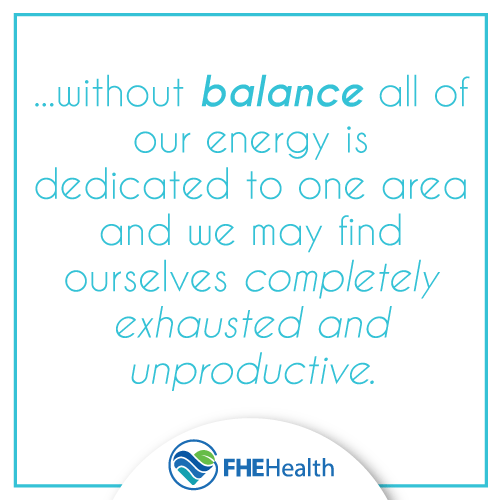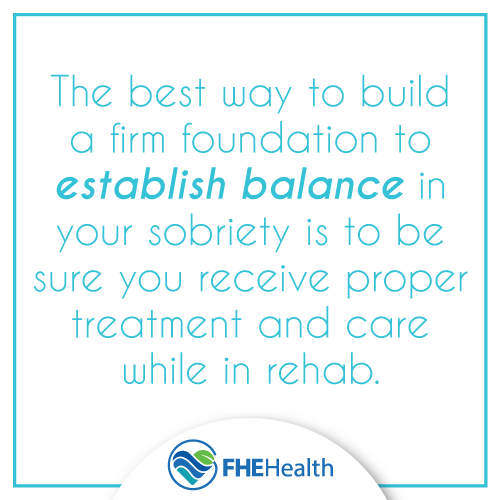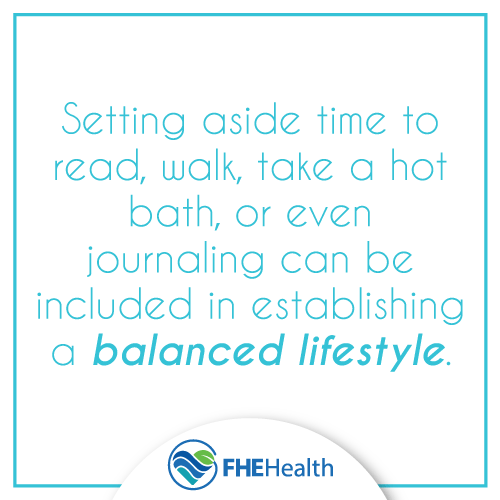
Balance…a word that is cringeworthy to every alcoholic – sober or still drinking. The truth is, most of us have extreme personalities, completely void of any moderation. Think of the game whack-a-mole, the second we begin addressing our addiction, an extreme character defect pops up to the surface. As addicts, we spend our lives in the vicious cycle of obsession and compulsion. It’s no coincidence that neither of these acts implement any sort of balance, but rather the contrary.
After spending years serving only one purpose, we may find a balance to be a seemingly impossible task to achieve. Truthfully, we may even miss the drama, stimulation, and chaos of our lives in active addiction. We may even find ourselves jumping into codependent relationships, workaholic tendencies, and even overeating. The extreme behaviors can be an early warning sign of potential relapse. It is important that we learn how to find moderation in all we do, in order to live a more peaceful and balanced life.
All or Nothing Mentality
 There are two extreme mentalities that most of us gravitate towards in early recovery. The first extreme is taking on all responsibilities and trying to do everything at once. Most of us have found, that when we seek this particular method, we become overwhelmed and ultimately procrastinate on all tasks set before us. In early recovery, most of us have no idea how to organize, prioritize, or plan. The end result, for an addict like me, is utter procrastination and ultimately avoidance.
There are two extreme mentalities that most of us gravitate towards in early recovery. The first extreme is taking on all responsibilities and trying to do everything at once. Most of us have found, that when we seek this particular method, we become overwhelmed and ultimately procrastinate on all tasks set before us. In early recovery, most of us have no idea how to organize, prioritize, or plan. The end result, for an addict like me, is utter procrastination and ultimately avoidance.
The other extreme is propelling all energy into one area, negating all other responsibilities. We may find ourselves hyper-focusing on only one area of our lives, from work, personal relationships, working out, to wellness. While all of these things may seem positive steps, without balance all of our energy is dedicated to one area and we may find ourselves completely exhausted and unproductive. These two patterns of behavior promote an unbalanced lifestyle and may contribute to stress and pressure, ultimately leaving a recovering addict vulnerable to relapse. Here are 4 ways you can find balance in recovery.
Find Proper Treatment in Rehab
The best way to build a firm foundation to establish balance in your sobriety is to be sure you receive proper treatment and care while in rehab. According to the National Institute on Drug Abuse, adequate treatment requires the implementation of these effective principles:
- Addiction is a complex, but a treatable disease of the brain.
- Individualized treatment plans must be customized to fit the needs of each patient, including medical, psychological, and social issues he/she may be facing.
- Creating a case management plan that will require each individual to remain in treatment for as long as needed
- Incorporating appropriate medications for detox and actively participating in behavioral, individual, and even family therapy.
- Treating co-occurring disorders simultaneously and implementing an appropriate aftercare plan
- Easily accessible treatment
Find Discipline and Establish a Routine
 The most effective way to implement balance, for me, has been through establishing a routine and applying self-discipline. If anyone were to ask me the definition of discipline I would tell them it was synonymous with punishment. My sponsor suggested I look up the definition and find one that didn’t sound so harsh. My favorite definition is to train oneself to do something in a controlled and habitual way. It brought me great relief to hear that, through discipline, I could have control over my own actions. As we get sober, it is important we plan out our week- one day at a time. When we take the time to write down a schedule of our weekly responsibilities we are able to organize and prioritize our responsibilities, suddenly things may not seem so overwhelming; and through discipline, we are able to establish a balanced routine.
The most effective way to implement balance, for me, has been through establishing a routine and applying self-discipline. If anyone were to ask me the definition of discipline I would tell them it was synonymous with punishment. My sponsor suggested I look up the definition and find one that didn’t sound so harsh. My favorite definition is to train oneself to do something in a controlled and habitual way. It brought me great relief to hear that, through discipline, I could have control over my own actions. As we get sober, it is important we plan out our week- one day at a time. When we take the time to write down a schedule of our weekly responsibilities we are able to organize and prioritize our responsibilities, suddenly things may not seem so overwhelming; and through discipline, we are able to establish a balanced routine.
Practice Self Care and Learn to Say No
 Balance in recovery requires us to practice self-care. Self-care may include adequate sleep, exercise, and healthy eating. Taking care of ourselves is not only limited to the physical aspects of our lives. Practicing self-care also includes taking care of yourself emotionally and within your recovery. Setting aside time to read, walk, take a hot bath, or even journaling can be included in establishing a balanced lifestyle. When I first got sober, I believed that taking any time for myself was selfish and simply not allowed. I was under the impression that I also had to say “yes” to anything that was asked of me. These misconceptions cultivated resentments, victimization, and impossible expectations of myself. It is important we learn how to say no when we mean no. We can avoid the temptation to take on every that comes our way, by evaluating our available time and remembering it is okay to say no.
Balance in recovery requires us to practice self-care. Self-care may include adequate sleep, exercise, and healthy eating. Taking care of ourselves is not only limited to the physical aspects of our lives. Practicing self-care also includes taking care of yourself emotionally and within your recovery. Setting aside time to read, walk, take a hot bath, or even journaling can be included in establishing a balanced lifestyle. When I first got sober, I believed that taking any time for myself was selfish and simply not allowed. I was under the impression that I also had to say “yes” to anything that was asked of me. These misconceptions cultivated resentments, victimization, and impossible expectations of myself. It is important we learn how to say no when we mean no. We can avoid the temptation to take on every that comes our way, by evaluating our available time and remembering it is okay to say no.
Lean on Your Support and Ask for Help
Recovery is an ever-evolving learning curve. As we grow, we continuously experience new emotions and take on entirely new perspectives. I spent a lot of my earlier time in recovery, trying to do it all myself. Perhaps it was my stubborn nature, or my subconscious self sabotaging behaviors creeping in…but early on, my mantra was I got this. This insane ideology left my life completely chaotic and unbalanced. Through a multitude of pain, I began seeking out the support of other women in the rooms of A.A. and asking for help. It is important for us to establish a firm foundation within our sober support. These men/women can help support and guide us when we find ourselves overwhelmed and unbalanced. I have a list of friends that don’t chastise me when I ask for help with the kids to make a meeting or meet with my sponsor. They rise to the occasion and I get to suit up and show up to do the same for them. Recovery is all about extending a hand to help the next addict as we all learn how to live a balanced life together.






